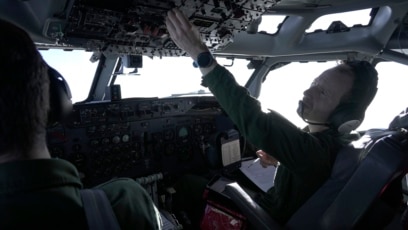Studies show that military officials are increasingly deploying systems to interfere with aircraft navigation systems in conflict areas. But such tools can put other aircraft at risk.
Airplanes depend on complex navigation systems to guide pilots and to warn of possible danger during a flight. Such systems are known as global navigation satellite systems (GNSS).
The most commonly used GNSS system is called GPS, which stands for global positioning system. The GPS system is owned by the American government and operated by the U.S. Space Force. The GPS system uses a series of satellites to send signals to receivers, which identify the exact positions of objects.
The U.S. Space Force says it develops and operates all space and Earth-based activities related to the GPS system. A civilian version is available for people to use freely around the world. A military GPS service is also available to U.S. and allied armed forces, as well as approved federal agencies.
Other GNSS systems operate internationally. These include BeiDou, which is run by the Chinese government. The European Union leads the Galileo GNSS, while Russia operates a service called GLONASS.
Systems have been developed to disrupt these GPS services, especially in areas of conflict. Military leaders and groups have deployed such tools to harm enemy aircraft operations. Industry experts say such efforts affect electronic systems and can lead to dangerous flight errors.
There are two main methods used to disrupt GPS operations. One is called “jamming.” Jamming involves sending out radio signals within an area to overpower all other signals so that GPS receiver devices cannot effectively operate.
The other method is called “spoofing.” This is when technology is used to trick a GPS receiver into estimating a false position.
Incidents of jamming and spoofing have been identified in several conflict areas. These include around Ukraine, which is fighting Russia and around Gaza, where Israel is fighting Hamas.
The French news agency AFP reports that Hamas fighters in Gaza have been using jamming methods to block GPS signals used to guide Israeli drones operating there. In an effort to keep its drones flying in Gaza, Israel has been using a technology designed to resist jamming.
The technology, called GPSdome2, was created by Israeli developer InfiniDome. The company’s products are designed to protect against jamming tools. They were deployed soon after Hamas’ October 7 attacks in Israel that started the Gaza conflict.
In addition to using anti-jamming tools to keep its own aircraft operating, Israel has also taken measures to disrupt the GPS of Hamas and other opponents, the news agency reported.
Israel’s army has admitted that days after the Hamas attacks, it moved to “proactively” disrupt GPS in order to carry out “operational needs.” Disruptions by Israel included both jamming and spoofing methods, AFP reported.
In one example, an AFP reporter standing on a street in Jerusalem was shown on GPS to be near Cairo, Egypt. In another case, a reporter in the West Bank city of Jenin was listed on GPS as being at Beirut’s airport in Lebanon.
Since the start of the war in Ukraine, the European Union Aviation Safety Agency (EASA) has been warning that GNSS signal disruptions have intensified. In some cases, such disruptions can change a plane’s path or even cause it to land at the wrong place, EASA said.
The agency’s acting chief, Luc Tytgat, told AFP that GNSS systems are necessary to improve safety in increasingly crowded airspaces. “But we have seen a sharp rise in attacks on these systems, which (presents) a safety risk,” he said.
Tytgat suggested that aviation agencies should consider changing the current certification requirements for “navigation and landing systems.”
Todd Humphreys and a team of researchers at the University of Texas at Austin examine GPS signals around the world. After October 7, the team discovered spoofing activity that led some planes headed for Israel to disappear from GPS for a short period.
Humphreys told AFP the examinations showed “Israel appears to be engaging in GPS spoofing as a defensive measure.” He noted the “false GPS signals” had tricked receivers around northern Israel into thinking they were at Beirut’s airport.
I’m Bryan Lynn.
Bryan Lynn wrote this story for VOA Learning English, based on reports from Agence France-Presse and Reuters.
Quiz – GPS ‘Spoofing’ in Conflict Areas Puts Other Aircraft at Risk

Start the Quiz to find out
_____________________________________________
Words in This Story
navigate – v. to find the right direction to travel in by using maps of other equipment
disrupt – v. to interfere with a normal activity
drone – n. an unmanned aircraft
proactive – adj. taking action on something beforehand instead of just reacting to change when it happens
certify – v. to say in a formal or official way that something is true or correct
engage – v. to carry something out
